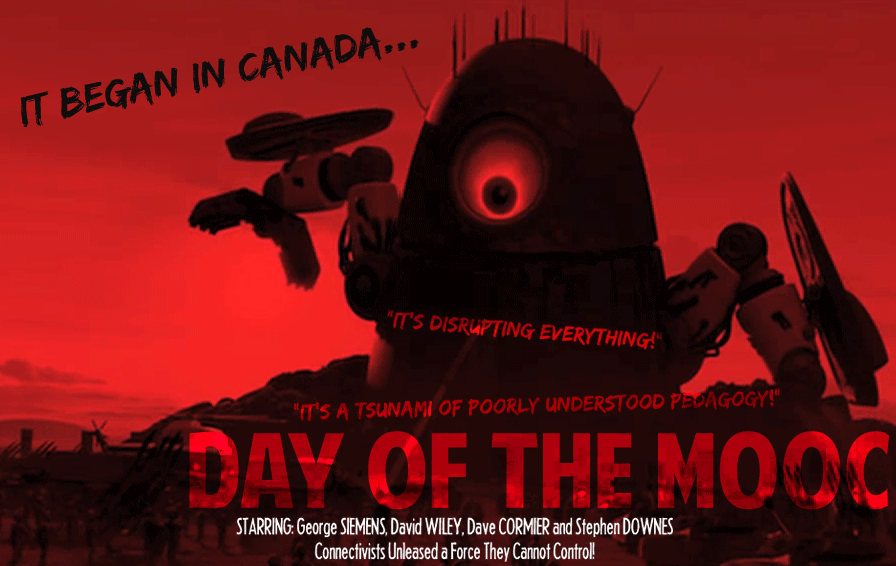Judging by the media frenzy last year, largely driven by reporters in North America, 2012 could be labelled the "year of the MOOC".
 |
| Day of the MOOC Poster by David Kernohan for the DS106 Horror of MOOCs assignment. Remixed as an animated gif by Michael Branson Smith |
Using scenario planning to navigate the xMOOC phenomenon
Vice Chancellors and Chief Executive Officers of tertiary education institutions around the world are coming under increased pressure from their respective governing bodies and stakeholders to answer the question: What are we doing about MOOCs? Scenario planning is a tool which could assist executive leaders in answering this question. As a small non-profit, I have used scenario thinking extensively in guiding our strategic innovation decisions for the OER Foundation to establish a sustainable and scalable OER university collaboration.
For example, the OERu is a real-world example of the quality branded consortia scenario of the DEANZ 2016 scenario set. The self-determination DEANZ scenario provides a framework which is informing strategic thinking of the OERu's increased focus on micro Open Online Courses (mOOCs) because this delivery format will facilitate learner-driven customisation of OERu offerings leading to pathways for formal accreditation. (In this context micro does not refer to size, but rather a subcomponent of the learning outcomes of a full course.)
The funding and operational model of the OERu network has drawn on conceptual scenarios I have constructed, for instance, where the commercial MOOC startups gain considerable market share giving rise to the question: How will the OERu network and its member institutions retain competitive advantage? (The answer to this question is relatively easy. As the OERu will base all our courses solely on OERs, the "competition" will not be able to replicate our cost structures using a closed-content model. The only viable response for the competition will be "if you can't beat them, join them" which would force systemic growth and mainstream adoption of open education models in the formal sector thus helping the OER Foundation realise its core philanthropic mission. A textbook win-win solution.)
As we begin to reflect on the major uncertainties facing the future of higher education in the during our pilot Scenario Planning for Educators (SP4Ed) online workshop, it is noteworthy that a number of the international thought leaders who we invited to share their views on the fundamental drivers of change for the future of education have included uncertainties associated with MOOC-like delivery in their video signposts.
Terry Anderson, for example, considers how the Internet has facilitated radical reductions in the cost of production and dissemination of resources to support student-content interactions and references the challenge questions associated with the "deskilling" of the academy and the growing reluctance among learners and employers to rely on traditional models of assessment for authentication of learning. Sir John Daniel, for instance, confirms that OER is a certainty but suggests that MOOCs are an uncertainty remarking on the current herd behaviour of higher education institutions joining the MOOC phenomenon in the absence of an obvious way for institutions to cover the costs of development.
Clearly, fiscal sustainability is a key issue for open education futures.
Incremental design to bootstrap a fiscally sustainable OERu innovation.
The OER Foundation has adopted an incremental and agile design approach to ensure a fiscally sustainable OERu collaboration for the future. We have bootstrapped the project from the bottom-up avoiding the challenges of having to recoup significant deficits (or figure out how to repay venture capital investments).
At the recent annual meeting of the Board of the OER Foundation, I was able to report that we're well on track to achieving a sustainable and scalable OERu international collaboration. We have achieved 60% of the contributing members required for the breakeven threshold. Furthermore, I'm reasonably confident that we have sourced adequate transition funding for the next two years which will provide us with the time to recruit the additional 15 anchor partners needed for a self-sustaining OERu collaboration without reliance on third-party funding. This is the point where the OERu collaboration will scale because we will be able to commission the paid development of OERu courses for the benefit of our contributing members. This also means that our OERu partners will not be required to contribute more than two courses to the network. Scenario planning has contributed to achieving a fiscally sustainable and scalable solution.
 We have also leveraged our learn-by-doing philosophy to assist with the development of the OERu delivery model. In February 2007, the WikiEducator community with support from the Commonwealth of Learning hosted the pilot Learning4Content (L4C) open online course. This L4C pilot was distinctive because:
We have also leveraged our learn-by-doing philosophy to assist with the development of the OERu delivery model. In February 2007, the WikiEducator community with support from the Commonwealth of Learning hosted the pilot Learning4Content (L4C) open online course. This L4C pilot was distinctive because: - it used an open wiki design model for its development,
- registration was both free and open,
- it was presented entirely online,
- was based solely on OERs and
- was designed to scale for large numbers of learners.
Over the past six years, the WikiEducator community and OERF has gained valuable experience in refining open design models, pedagogical approaches and supporting technologies for delivering open online courses. For example, the OERF developed a another open online course called Open Content Licensing for Educators (OCL4Ed) with funding support from the UNESCO Office for the Pacific States. OCL4Ed is an open online course designed for educators and students who want to learn more about OER, copyright, and Creative Commons licenses. During 2012, we hosted three OCL4Ed workshops registering approximately 2000 students from +90 different countries. This experience was used to inform the development of the current SP4Ed course where we have further refined our technologies and designed the structure of the course for the next incremental step, namely the implementation of micro-credentials for mOOCs. These micro-credentials will map to the specified learning outcomes of approved university courses, which simplifies the next step leading towards formal accreditation for mOOCs.
During the 2nd semester in the southern hemisphere, Otago Polytechnic will pilot two or three mOOCs for micro-credentials leading to formal certification of the course elective: Open Education Practice of the Graduate Diploma in Tertiary Education. This will be the first credential to be offered by the OERu network.
Incremental design, combined with the OER Foundation's philosophy of open philanthropy and a healthy dose of scenario thinking has helped us towards achieving a fiscally sustainable and scalable OERu. We are committed to shifting the question from "How do you achieve a sustainable OER project?" to "How will your organisation remain sustainable without OER?"
This is smart philanthropy. Using OER we can widen access to more affordable education futures for all students worldwide founded on our member institutions' agendas for social inclusion with opportunities for diversifying revenue models to sustain OER futures. The OERu is low risk, low cost but high impact innovation!
